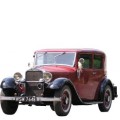Not Just Passenger Planes Have 'Black Boxes'
If you've ever seen or read news coverage of the crash of a large passenger airplane, you know that these planes are equipped with two so-called "black boxes." One captures cockpit voices, and the other technical information, from each flight. Black-box recordings can be crucial to reconstructing events should the plane go down. These nearly indestructible devices are almost universally praised as crucial tools in preventing future crashes.
But there's considerably less applause for a VARIATION of the black box. Unbeknownst to most drivers, U.S. auto manufacturers have been implanting data recorders in some of their vehicles for years. The purpose, they say, is to get an accurate picture of what was going on in cars before, during, and right after collisions.
This has outraged privacy advocates. They're worried that black-box data could be used to monitor people's everyday driving habits, even catching speeders so they can be sent tickets in the mail. The industry and the National Highway Traffic Safety Administration reply that this is science fiction. The equipment is not capable of such a thing. But the government highway folks HAVE notified auto manufacturers that by 2011, new-car buyers must be told if there's a black box in their vehicles. And carmarkers will have to standardize exactly what data are being captured, such as how fast the car was going before a crash, or whether the air bag worked properly.
Who knows? With all these advancements in electronics, in five years black boxes might be able to tell us what a driver was eating when he hit a deer. Describing what the DEER had been eating will take a little longer.

